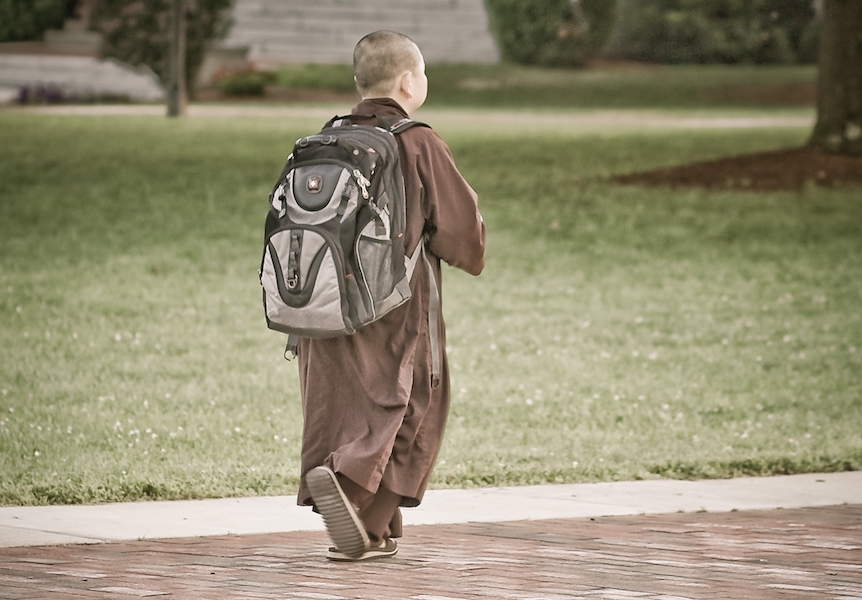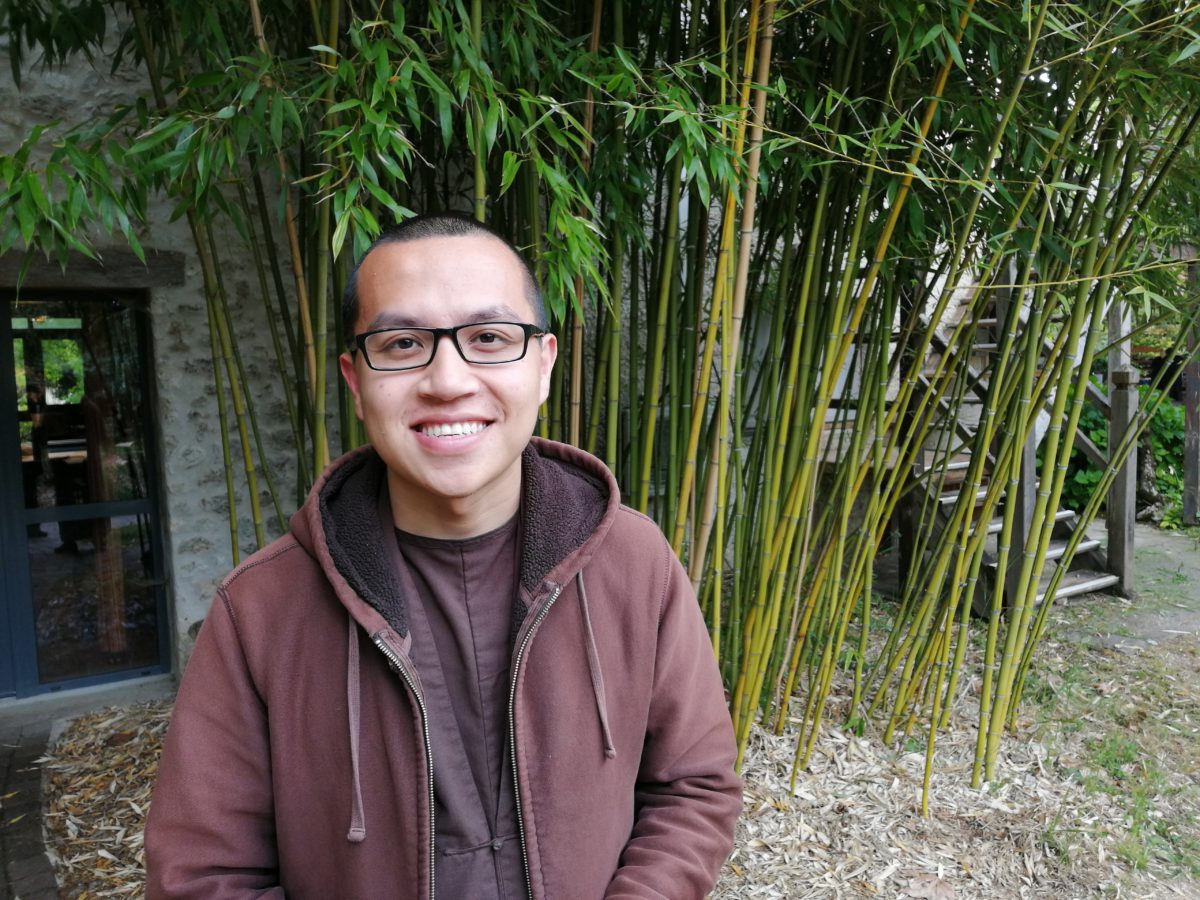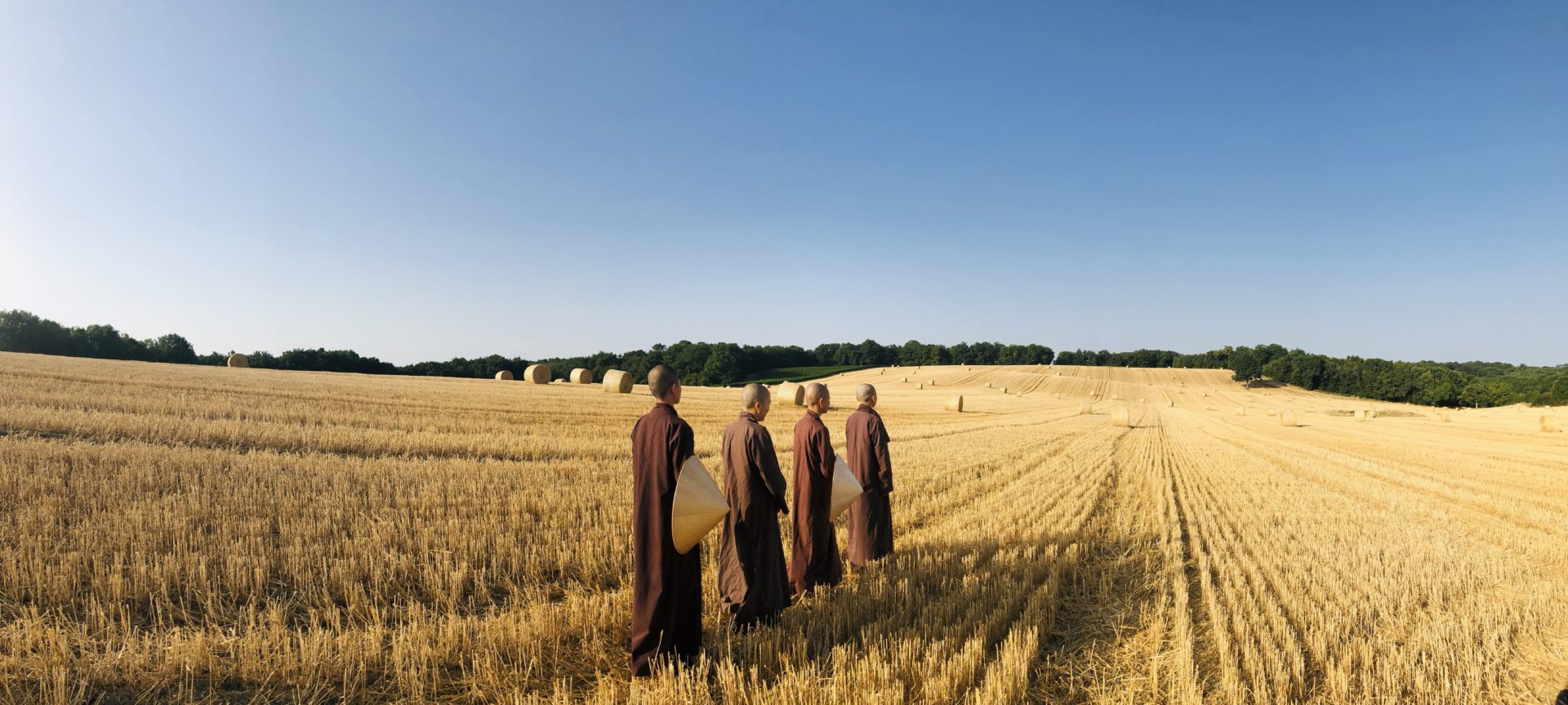By Brother Chan Troi Duc Khiem

I decided to become a monk in the spring of 2014 when I was eighteen years old, several months before I graduated from high school in Massachusetts. My parents were born and raised in Vietnam. In their twenties, they came to the United States for a better life. They settled on the East Coast,
By Brother Chan Troi Duc Khiem

I decided to become a monk in the spring of 2014 when I was eighteen years old, several months before I graduated from high school in Massachusetts. My parents were born and raised in Vietnam. In their twenties, they came to the United States for a better life. They settled on the East Coast, where they raised me and my siblings.
Until I was eighteen, I lived a free life and did things people said would bring happiness, such as attending parties. I did well in school. I had a job and a car. I played sports, mostly American football, as well as baseball, track, and basketball. I had romances with women and experienced everything that was supposed to bring happiness. But I suffered a lot. I needed to choose the next step.
A big part of my suffering was not having a path I was happy with. This spiraled into bigger questions: What is life? How did I get here? Is there a God, and if so, what does that mean? I wanted to figure out life and what to do while I’m here. This weighed on my shoulders and made me suffer. My only medicine was meditation. Every week or two, my parents brought me to the Vietnamese Buddhist nunnery fifteen minutes away from our house. The nuns were the happiest people I knew. When I started to meditate, this really helped me.
Then I saw a Buddhist monk on YouTube. He shared his wisdom and answered questions about life. I felt very happy about his answers; other answers to similar questions never satisfied me. I received his words of wisdom, and he healed me a lot. I felt as if I had been viewing the world as dark and pessimistic. With meditation, his wisdom, and support from my family, guidance counselors, and psychologists, I was able to look at life optimistically again. This took many months of contemplation.
I chose this life path because I wanted to be exactly like the monk who inspired me on YouTube. I aspired to become a Dharma teacher. I just wanted to continue meditation and give the world that healing. After I graduated from high school, I began living in a temple in my hometown and searched for a tradition to become a monastic. I settled in Plum Village and ordained as a novice monk on December 14, 2016. I have felt very happy ever since.
When I wanted to become a monastic, my parents were scared and said, “Please go to college for just one year to try it out.” But inside I felt there was no way. A year of college would mean taking a loan for at least twenty thousand dollars. As I thought about taking that loan, being in a hole of debt, and doing something I didn’t want to do, I gained enough courage to say, “I can’t do that. I’m going to move forward with becoming a monk.”
Knowing my character—I’m passionate about what I do and a little stubborn—my parents felt it was best to support me. Also, at the time, I had had two episodes of psychosis. I think people understand that psychosis means the spirit is broken and weak. Before I began meditating, I smoked weed a lot; I acted selfishly; I didn’t think about my loved ones. One night, I smoked weed as usual and experienced something similar to a psychotic break. It wasn’t pleasant or beautiful. It was scary. From there, I developed a type of schizophrenic symptom: paranoia. This was before I started meditating.
When I got into meditation, I told my family I wanted to become a Buddhist monk. I think their point of view was, “Our son is healing; he’s happy again and he’s becoming a Buddhist monk.” Monks are wonderful, just like the nuns at the Vietnamese Buddhist nunnery who helped me so much in life. I could imagine my parents thinking, “We’re scared because it’s not a secure path, but at the same time we want support him, so we’ll see.” This had been their attitude with me: taking things day by day, year by year.
Fast forward four years. My parents are now happy and proud of me. Either my parents or my siblings visit me at least once a year. I feel they are practitioners, too. My mom tells me that every night before she goes to bed, she’s on her phone reading on the Plum Village website and watching Dharma talks on YouTube. She’s always telling me funny stuff about the Dharma talks she watches. Her sharing makes me very happy. It may be my way of keeping in contact and nourishing this relationship. I’m not as austere as some other monastics. I call my parents every Sunday and my siblings once every week or two. My relationship with my siblings is more relaxed. They understand our parents are my priority.
I also write letters to my parents and close friends of mine. I email my siblings, because it’s easier for them and quicker. As a monastic, I have a good head on my shoulders. As a lay friend, my head was off my body; I was up in the clouds. Now I feel good, and I didn’t necessarily expect these feelings.
I think about my eighteen-year-old self who wanted to be a Zen Master. I thought that meant being isolated in a forest or in a cave, somewhere alone or maybe with a teacher, meditating all day and trying to get a lot of wisdom. I had the idea that when I became a Zen master, I would travel and give Dharma talks like ones I watched on YouTube. I would have an audience in front of me. This was my first mental image of my monastic life. Now, after two years as a monastic, my life is different from that, in good ways.
Thay and the Plum Village monastics have trained me to be more realistic and down to earth; in monastic life, I work more than I imagined I would, which is a positive difference. I’m in contact a lot with my previous ways of thinking, like organizing, planning ahead, and dealing with little annoying stuff like getting enough tape, paper, and pens.
Thay has wisely given our generation the system of a modern monastic life. We need to do things that create income to buy rice. It’s not like in the Far East, where the weather was hot. There, I could just walk to town, and people would give me food. In Plum Village, we need gas and water. We buy organic food, and we have heating in the rooms for the retreatants. An important part of our monastic life is offering retreats.
This is an essential part of our serving the world. If we remove this way of life, then we are not Plum Village monastics. If I stop serving and offering retreats, then I’m not a Plum Village monk. I would probably leave the community if we were not doing it. I would probably be unhappy, because that’s our life source. This is the way I see it: the work needs to be done with happiness.
On the other hand, it is a good training. I wake up to the four pillars for a healthy spiritual lifestyle: practice, work, play, and study. In my previous image of monastic life, I missed the part about work. I thought I would meditate all day. Now, practicing these four pillars, I see how important balance is. Without working to create retreats, I would not be happy. Work is a big part of the difference, in a good way, about my life—the difference between what I thought it would be and what it is now.
THIS ARTICLE IS BASED ON AN INTERVIEW BY ANNICA BAUER IN DECEMBER 2018, TRANSCRIBED BY MARTINA MCNABOE.

Brother Chan Troi Duc Khiem (Brother True Humility) is from central Massachusetts, US. In the winter of 2016, Brother Duc Khiem became a novice monk in Plum Village, France. He enjoys his time meditating, reading, writing, and spending time with his friends in Plum Village.

